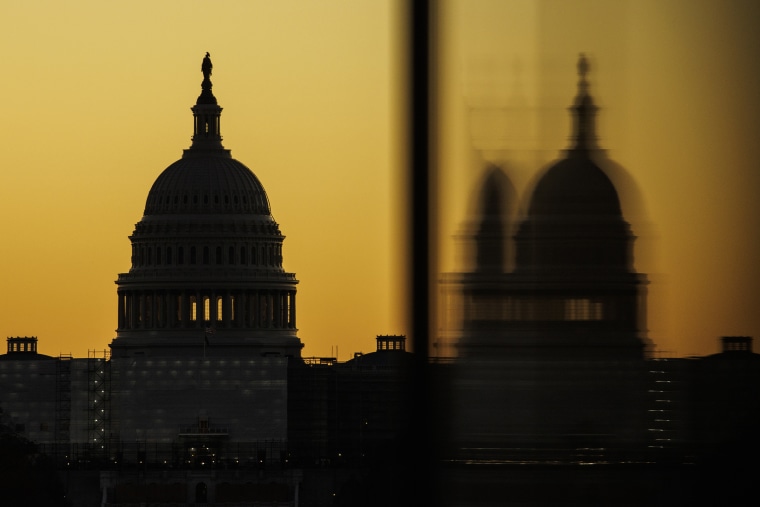WASHINGTON — The House on Friday voted to finalize a massive $1.7 trillion government funding bill, sending it to President Joe Biden and marking the end of two years of Democrats controlling both chambers of Congress.
The package contains a major boost to military spending and nearly $45 billion in assistance to Ukraine. It overhauls federal election law by revising the Electoral Count Act of 1887 to try to prevent another Jan. 6. The bill funds a swath of domestic programs as well, averting a shutdown and keeping the government funded through next fall.
The vote was 225 to 201, largely along party lines. Nine Republicans voted for the measure, including outgoing Reps. Liz Cheney of Wyoming; John Katko and Chris Jacobs of New York; Adam Kinzinger and Rodney Davis of Illinois; Jaime Herrera Beutler of Washington; and Fred Upton of Michigan.
GOP Reps. Brian Fitzpatrick of Pennsylvania, co-chair of the bipartisan Problem Solvers Caucus and Congressional Ukraine Caucus, and Steve Womack of Arkansas, a senior appropriator, also supported the measure, while Democratic Rep. Alexandria Ocasio-Cortez of New York voted against it and Rep. Rashida Tlaib of Michigan voted present.
“We have a big bill here, because we have big needs for our country,” outgoing House Speaker Nancy Pelosi said on the floor. “At the same time — please to put a penny in the old man’s hat — we address the needs of America’s working families, with special focus on our children.”
The legislation passed the Senate on Thursday by a vote of 68-29.
Biden has championed the bill. In a statement after its passage, he called it "good for our economy, our competitiveness, and our communities" and vowed to sign it into law "as soon as it reaches my desk."

Biden also thanked Senate negotiators "for finding compromise to strengthen our democracy in the face of election denialism and assaults on our bedrock constitutional values."
The measure was negotiated by Democratic leaders and top Senate Republicans, including Minority Leader Mitch McConnell of Kentucky. It revealed a sharp split between Republicans in the two chambers, with House GOP leaders fighting to torpedo it.
House Minority Leader Kevin McCarthy of California blasted the legislation and the process by which it was crafted, calling it “a slap in the face to every American that voted” to elect a House Republican majority in the 2022 election.
“This is a monstrosity,” he said before the vote, arguing it spends too much. “It is one of the most shameful acts I’ve ever seen.”
“You have done nothing but put politics before the people of America. So you know what? They fired you. They fired you,” he said, claiming that there’s “money for wokeism” in the bill.
And the rhetoric became more heated. Rep. Scott Perry of Pennsylania, a member of the right flank of the GOP caucus, said Democrats were “destroying our country.”
The divisions foreshadow a difficult two years ahead for Republicans as they oversee a paper-thin House majority and face down a Democratic-led Senate and Biden presidency.
The election overhauls in the bill would make it abundantly clear that the vice president cannot discount electoral votes, and the measure would raise the threshold to object to counting them from one member of each chamber to one-fifth of each chamber.
Democrats wanted a broader package of election and voting laws, but they were constrained by Senate rules that necessitated at least 10 Republican votes to defeat a filibuster.
“It’s a good step,” Rep. Jamie Raskin of Maryland, a member of the Jan. 6 select committee, said in an interview. “I want the abolition of the Electoral College, and I want to repair the Voting Rights Act, and I want criminal penalties for intimidation of election workers. So I think that that would be the strong way to go. But I’m not averse to saying that the vice president can’t run off with the football and declare the loser the winner.”
In an interview, McConnell told NBC News that it was “extremely important” to him to boost military spending above nondefense domestic spending, describing it as essential to combating China.
“We not only needed to help Ukraine, we also needed, within the defense budget, to dramatically increase it so the baseline next year is even bigger,” McConnell said on Wednesday. “We’ve spent an awful lot of money on domestic priorities over the last few years. Some of them are justified during the pandemic. But the current emergency is not here, it’s over there.”
McConnell also acknowledged his differences on the bill with McCarthy, who is courting votes from the GOP's right wing to become speaker of the House in a few weeks.
“I have a really good relationship with McCarthy, but he’s got a difficult hand to play,” McConnell said. “We all want him to succeed and hope he does.”
